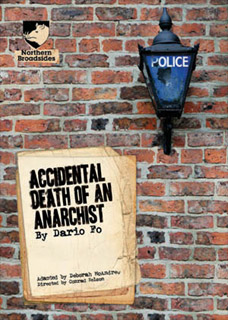
| HOME |
| NERVE |
| REVIEWS |
| ARCHIVE |
| EVENTS |
| LINKS |
| ABOUT US |
| CONTRIBUTORS |
| BACK ISSUES |
| CONTACT US |
 Accidental
Death of an Anarchist
Accidental
Death of an Anarchist
Written by Dario Fo, adapted by Deborah McAndrew
Directed by Conrad Nelson
Liverpool Playhouse (4th-8th
November 2008)
Reviewed by Alfonso Barata
Dario Fo’s Accidental Death of an Anarchist is - and excuse me for the clichés here - a timeless and universal play. Whether it is based in Italy in the seventies - as the original text was - or Britain in 2008 following this adaptation by Deborah McAndrew, the truth is that this hysterical and chaotic but nonetheless provocative exploration and exposure of the abuse of law and corruption remains one of the most enduring and critical plays of the second half of the twentieth century.
Thanks to this and many more examples, Fo’s work has been widely recognised and celebrated. His most notorious moment came in 1997 when - against the odds - he was awarded the Nobel Prize for Literature (something the Vatican furiously protested about; years earlier, it had labelled Fo’s Mistero Buffo as ‘blasphemous’).
By choosing to adapt this play Northern Broadsides clearly struck gold. Appropriately adapted to the current British political landscape, and far from losing sight of the events that led Fo to write the play in the first place (a terrorist attack at a Milan bank in the seventies), it somehow reinforces the idea that misuse of power leads to inconvenient questions and uncomfortable, unconvincing answers; anywhere, anytime.
We are quickly reminded of all this. As we sit down, we are confronted with a portrait of retiring Commissioner of the Metropolitan Police Ian Blair, hung on one of the walls amongst the coldness of a police office.
It also manages to remain close to home whilst not losing its Italian twist - which is obvious in its commedia dell’arte-influenced method - together with the buffoon style of which Fo is a master.
From the start, the play descends into a hilarious and farcical journey about the fate of an anarchist, whose ‘accidental’ death, after falling from a window in the police HQ’s premises, has provoked questions from the public.
An inquest about this man’s death is about to be open: the Home Office needs to find scapegoats, an investigative journalist wants to grab the headlines and nobody wants to assume responsibilities. Sounds too familiar? Well, in case we hadn’t notice, we are further reminded with a number in which the characters embark on a song that explicitly namechecks Jean Charles de Menezes, who was shot dead by police in the London Underground system in 2005.
Perhaps the great achievement of this adaptation is that it manages to make theatre relevant to contemporary audiences with its thought-provoking and unrestrained approach, exposing the behaviour and moral codes of the ruling elites, which are pretty much the same now as they were then.
But more important is the fact that while doing all the above, the audience is ensured a thrilling experience by a group of actors, who deliver an outstanding performance, drawing the best of their characters and producing moments of absolute hilarity.
I had seen this play represented years ago; it was a different company, in a different country and language, with a different approach to theatre and definitely in a different political climate (it was before 2001). What remains the same, however, is the fact that on both occasions I left the theatre highly satisfied and grateful to Dario Fo and the respective company for such display of talent.